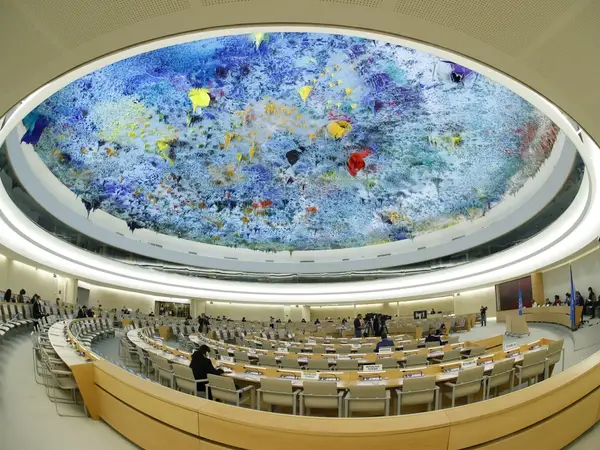The United Nations’ fact-finding mission, set up in December 2022 following Iran's bloody crackdown on protesters, will release its comprehensive report on March 18.
The mission is also scheduled to release its preliminary report on the International Day of Women (March 8).
In his address to the 55th session of the United Nations Human Rights Council (HRC) in Geneva on Monday, Iran's Foreign Minister Hossein Amir-Abdollahian accused the UN of double standards and criticized it for setting up the fact-finding mission for Iran but not taking any serious action on Israel’s killing of civilians in Gaza.
“We will not forget the outcries in this place months ago under the pretext of an Iranian girl’s death and the formation of a so-called fact-finding mission,” he said.
In her address to the same meeting Monday, the German Foreign Minister Anna Baerbock called for extending the mission’s mandate. “I want to be crystal-clear to those who claim that calling out violations is an interference in internal affairs: Human rights are universal. A life is a life,” she said.
Mahmoud Amiri-Moghadam, director of Oslo-based Iran Human Rights Organization, told Iran International on Monday that it is the outcome of the mission’s investigations that is of great significance and expressed hope that its mandate would be extended for another year.
“The Islamic Republic has always accused human rights organizations and the UN rights bodies of being politically motivated and has never been accountable to them, he said. “But the mission’s report will be a very important message to [Iranian] people who will know the world has heard them …, especially if the mission concludes that [the regime’s actions] were crimes against humanity,” he added.
The UN Human Rights Council voted November 24, 2022, to launch an independent investigation into Iran's deadly repression of peaceful anti-government protests during the Woman, Life, Freedom movement. The motion to form the mission passed with 25 votes in favor, six opposed and 16 countries abstaining from the vote. The following month, members of the mission were announced.
The death of 22-year-old Mahsa Amini in September 2022 in the custody of the morality police unleashed a wave of protests across Iran that lasted until February 2023.
During the protests, security forces killed more than 550 civilians including tens of children. Security forces also blinded scores of protesters with shotgun pellet aimed directly at their faces, and tortured many of the tens of thousands of protesters that were arrested. Many of the victims also claim to have been sexually assaulted during interrogations and in prison.
In the past year Iran has also hanged nine protesters despite widespread pleas at home and abroad not to carry out the death sentences after sham trials held behind closed doors and without due process.
Despite these documented atrocities, Tehran almost immediately announced that it did not recognize the fact-finding mission and would not cooperate with it and summoned the German envoy Hans-Udo Muzel to the foreign ministry to protest Berlin’s key role in urging a special Human Rights Council meeting and the formation of the mission.
The UN Special Rapporteur on Iran Javaid Rehman said in November 2023 that the mandate of the mission goes beyond Iran’s human rights violations during 2022 protest crackdown and even extends into the mass execution of political prisoners in 1980s as well as violations of minority rights.
Members of the mission have not been allowed to visit Iran to collect evidence and speak to victims of the violence or their families. The Islamic Republic has also refused to allow UN special rapporteurs on human rights to visit the country since 1992.
